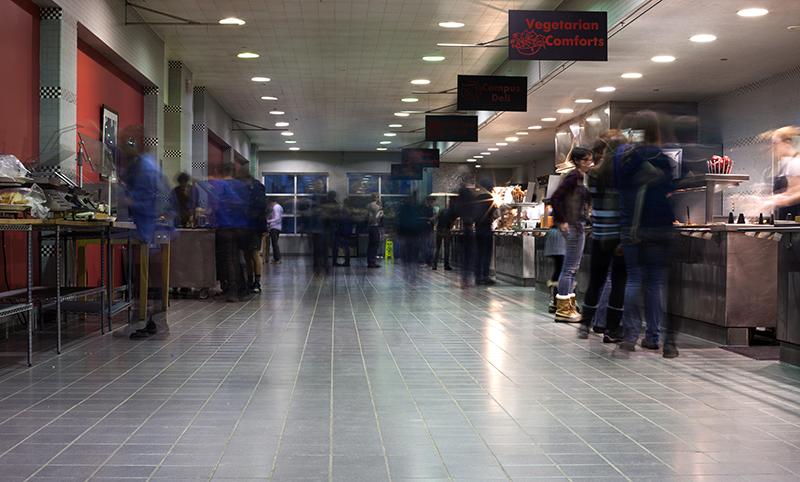College and Churches Partner to Offer Free Food
Students get food at Stevenson Dining Hall. Though dining halls close during spring and fall breaks, this spring break Senate is partnering with local churches to increase access to food for students who plan to stay on campus.
March 6, 2015
Several student senators worked with Community and Government Relations Assistant Tita Reed and First Church Pastor David Hill to organize a program to offer students free meals during the break. The program is intended to assist students who can’t afford to return home for break and need help paying for food. The meals will be provided by several of Oberlin’s local churches, including Christ Episcopal, First United Methodist Church, the First Church in Oberlin UCC and the Unitarian Universalist Fellowship.
Senator and College junior Ty Wagner, who helped formulate the plan, read online about the issues low-income students face when staying on campus for break.
“Fall break was coming up, and people were posting on Oberlin Confessions and Yik Yak that they were going to struggle to eat healthily or eat at all over fall break,” Wagner said. “And I thought that was extremely unacceptable and sad in this place with so many resources, so we wanted to do something about it.”
In a survey sent to students, 265 said they would be interested in taking advantage of these free meals. College senior and Senator Molly Brand says one challenge will be serving this many students.
“The survey was purposefully broad and inclusive, because the idea is everyone who needs food isn’t isolated as needy people,” Brand said. “We want it to be an inclusive meal where a group can go to enjoy food and be with friends, regardless of if they can’t afford to pay for food.”
In order to account for the potentially large number of students that could show up at these meals, Wagner said that the College promised to reimburse the churches for all additional food they have to prepare.
Most likely, a different church will prepare each meal of the day. The final plan hasn’t been decided yet, but First United Methodist Church has offered to serve a simple breakfast of things like juice, coffee and granola bars. First Church in Oberlin offered to serve lunch and the Unitarian Universalist Fellowship, located near IGA, offered to help. Finally, for dinner, Christ Episcopal Church will make its Community Hot Meals program, which is regularly open to community members, open to students as well. First Church plans to provide a similar service with its Wednesday dinner program. Additionally, Mount Zion Baptist Church and Sacred Heart Catholic Church have also offered to serve some meals.
One of the pastors most involved in coordinating the meals is First Church’s David Hill, who also runs a Wednesday night dinner at the church for around 30 locals. According to Hill, having students mingling with the various church communities will not only get students fed, but will also help strengthen the bonds between local churches and College students.
“When I [talked] to the student senators, one thing I discovered is everybody knew about everyone else, but no one was talking amongst each other because the College and the churches were in different circles,” Hill said. “The first thing this is, it’s just ministry to students, but I’ve heard from other pastors that they think it’s a great way for students to interact with the public. … It’s not trying to proselytize; we enjoy the presence of students and are happy to help. If you can eat at The Feve every night but choose to eat with us, we’re more than happy.”
According to Hill, this is a pilot program, so no one is sure exactly what the turnout will be. However, he and Wagner promised that the food will be of good quality and that there will be two options, including one that caters to vegans. Hill also added that the general consensus among the churches is that there won’t be three meals every day of break, since it’s not certain how many students will come out.
“I think it’s a really great plan, especially for students who come from a financially difficult background,” said College sophomore Benjamin Biffis. “For me, it’s not an option to fly home just because it’s so expensive for a ticket, but that makes staying here a little expensive. I know at home you can eat pretty cheaply, but now that I’m here, not having that resource and having to bike to a grocery store is pretty pricey. I can’t afford to fly home just to take advantage of cheaper food, so I think this is good because it gives any college student, regardless of your background, a way to get food easily.”
Biffis said he also questioned whether the school should be required to keep the dining halls open during fall and spring break, especially considering how expensive Oberlin tuition is.
“Honestly, I’ve always wondered why Oberlin doesn’t have dining halls open during breaks, especially with the rates we currently pay,” said Biffis. “A 19-meal plan is over $7000, which works out to almost $1000 per month, and I know that out by myself I could be eating for a lot cheaper than close to $1000 a month. … For winter break I understand, since it’s six weeks, but for just five days during fall and spring break, they could open for shorter hours a day with just a couple of the stations open, like pizza and sandwiches. That would make it a lot easier. “
For Wagner, the important thing is that no one will have to go hungry during the week.
“For the amount students pay to eat here, food should be provided by the school over break,” Wagner said. “Whether that’s through dining halls or churches, either way works for me.”





















